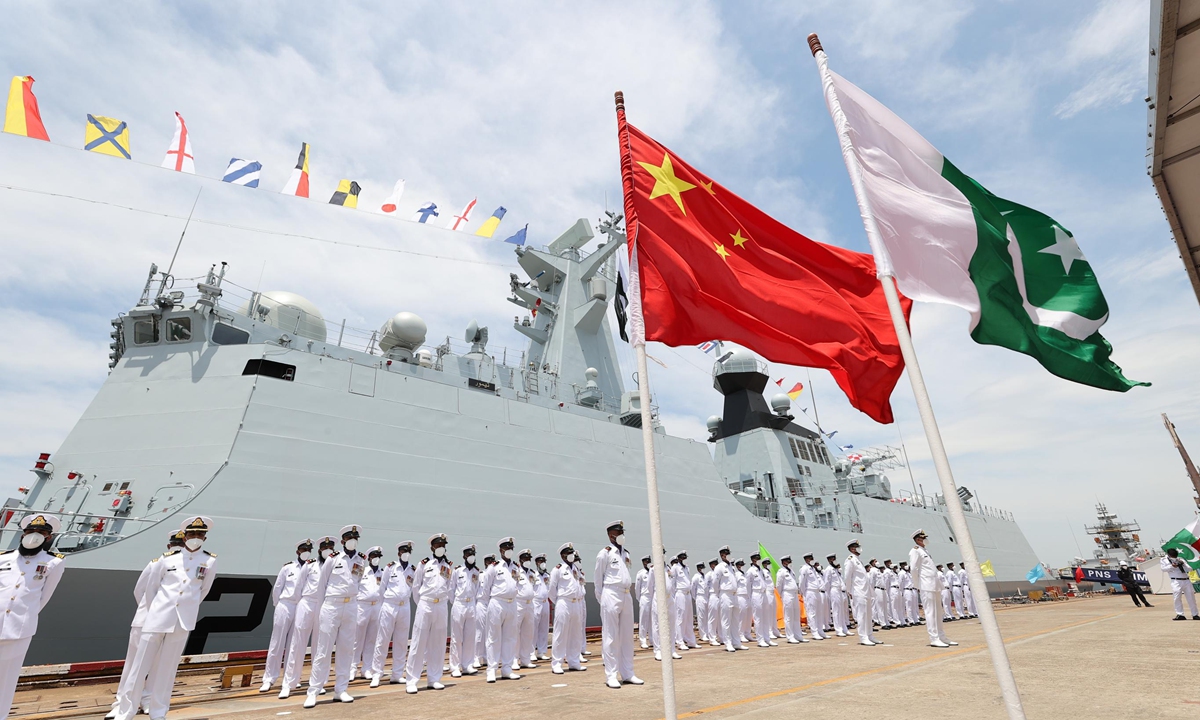A major attack has been reported in the naval airbase near Turbat, the headquarters of the Kech district of Pakistan’s Balochistan province, bordering Iran.
🔸🇵🇰 Naval Base attacked
– 4 BLA men claim killing <12 Navy personnel in Turbat, Balochistan
– 3rd attack in 2024 by BLA's Majeed Brigade pic.twitter.com/gwgntZNYqh
— Kreately.in (@KreatelyMedia) March 26, 2024
According to reports in Pakistan media, Dawn, Makran Commissioner Saeed Ahmed Umrani said that heavy exchange of fire and explosions were reported from the vicinity of Turbat airport. “The armed men attacked from three sides of the airport boundary, but security forces responded immediately and foiled their attempt to infiltrate the premises.”
“Six terrorists have been killed outside of the Turbat airport boundary, ensuring the safety of the base,” security officials said on Monday night, adding that a special operation wing of FC and the navy’s special services group successfully isolated the terrorists, Dawn report claims.
A senior government official in Quetta told the BBC that the attackers entered Turbat Airport from the civilian side but were prevented from advancing further by security forces. Commissioner Saeed Imran said that the exact number of attackers will be known when the clearance operation is completed.
The responsibility for this attack has been claimed by the Majeed Brigade of the Balochistan Liberation Army (BLA). The organization’s spokesperson claimed that its operatives attacked the naval air base in Turbat and managed to break through the security fence.
Pakistan’s second-largest naval air station, PNS Siddique, located in Turbat, is currently under a heavy attack marked by intense gunfire and multiple explosions. Known for its strategic importance and the stationing of Chinese drones, the naval base has become the latest target of the BLA’s elite unit, the Majeed Brigade, says the Balochistan Post.
The Majeed Brigade, in an email to journalists, claimed responsibility for the attack, stating, “We have entered the Pakistani Naval Airbase in Turbat.”
The BLA claims to have killed “over a dozen” Pakistani soldiers. The BLA has released an audio clip allegedly from one of its fighters involved in the assault on PNS Siddique. The recording features the fighter claiming that multiple Pakistani vehicles have been targeted, indicating both a continuation and intensification of the attack.
Gwadar: A Hot Target For BLA
A recent militant strike close to the port of Gwadar in southwest Pakistan has rekindled security fears about China’s Belt and Road initiatives and once again put the feasibility of the China-Pakistan Economic Corridor (CPEC) under the scanner.
Earlier this week, eight militants broke into the China Overseas Ports Holding-run Gwadar Port Authority facility, which is situated seven kilometers from the port proper and is a component of the China-Pakistan Economic Corridor (CPEC). A car laden with explosives crashed into the complex. Even though it did not fully detonate, five security personnel were killed, along with all eight attackers.
In a statement, the Baloch Liberation Army (BLA), the most notorious separatist organization in Balochistan, claimed responsibility for the attack. The BLA is infamous for carrying attacks on Pakistani and Chinese interests in the region.
Citing the Chinese as the port operator, the BLA described the attack as a warning to Western businesses considering investing in Gwadar. As Lin Jian, a spokesman for the Chinese Ministry of Foreign Affairs, stated, Beijing continues to support Pakistan: “We firmly support Pakistan’s efforts to fight terrorism and defend national security and stability,” he said, addressing reporters.
“We firmly support Pakistan’s efforts to fight terrorism and defend national security and stability,” he told reporters.
🚨🇵🇰💥 Report of massive attack on the Gwadar Port Authority, #Balochistan, according to locals continuous gunshots and a loud explosion heard, several Pak army armoured vehicles seen heading towards the attack site
Alleged visual from #Gwadar pic.twitter.com/eEYMr9p8A5
— OsintTV 📺 (@OsintTV) March 20, 2024
Several Baloch militant organizations in Pakistan have attacked Chinese targets in the past. These groups claim to have been battling for decades for a larger share of the wealth of minerals and mines in the region, which the central government in Islamabad has refused.
In November 2018, the Balochistan Liberation Army (BLA), a Baloch ethno-nationalist militant organization fighting against the Pakistani government for greater regional autonomy, opened fire on the Chinese consulate in Karachi. This was one of the major attacks by Baloch rebels. This was followed by the separatists attacking the Pearl Continental Hotel, which is located barely a kilometer away from the port, in 2019.
The attacks on Chinese nationals working in the region have since continued. However, the recent attack essentially challenges the security assurances given by the Pakistani government to their Chinese counterparts. China went so far as to build a compound within the premises of the $50 billion port to safeguard its nationals from terrorist attacks.
China has frequently asked Islamabad to take further steps to secure its citizens and interests. However, the tragic event raises doubts about the success of Pakistan’s attempts to increase security for Chinese interests within the nation.
Attack on Gwadar Port in Pakistan Foiled, Separatist Group Claims Responsibility
• Pakistani security forces thwarted an attack on the Gwadar Port Authority complex in Balochistan, killing eight armed fighters.
• The Balochistan Liberation Army (BLA) claimed responsibility… pic.twitter.com/5ZA61HstWM
— Aurang زیب Khan (@aurangk_khan) March 21, 2024
The attack comes weeks after Pakistan’s controversial elections, which saw the current Prime Minister, Shehbaz Sharif, assume power. The newly formed government wants to get back to working on CPEC projects, a prospect the Baloch separatists sternly oppose.
Part of China’s ambitious Belt and Road Initiative, CPEC is a planned network of roads, railways, and energy projects linking China’s resource-rich Xinjiang Uyghur Autonomous Region with Pakistan’s strategic Gwadar Port on the Arabian Sea. However, due to the opposition of the locals, China has been pushed to the edge. The residents of Gwadar allege that the region has been heavily militarized at China’s behest.
The attack happened inside a high-security zone in one of Pakistan’s most heavily guarded towns, according to Kiyya Baloch, an independent analyst who monitors violence in Balochistan. Kiyya told Nikkei, “Through this attack, Baloch separatists delivered a message to the world that Gwadar is not safe to invest in, for China or any other interested foreign party.”
Reports in Pakistani media on March 23 suggested that the Iron brothers, China and Pakistan, had mutually decided to expedite Phase 2 of CPEC with at least five new corridors. This underscores the importance of the Gwadar Port for China’s strategic ambitions, as it comes just days after the attack.
China Is Cultivating Gwadar
China places great strategic importance on the port of Gwadar, which is located close to the Strait of Hormuz on Pakistan’s Makran coastline.
There is widespread concern in India that Gwadar would eventually become a Chinese naval base and threaten India. Some analysts have argued that Gwadar port will soon become a PLA Navy foothold due to the PLA’s and the PLA Navy’s long-term goal of acquiring overseas bases for naval expeditionary fleets in the Indian Ocean.
This is because more PLA Navy personnel will undoubtedly be sent there to train submariners, maintain the port and its vessels, carry out repairs, and provide logistical support.

However, the most valuable feature of this port is its strategic location as a gateway between western China and the Indian Ocean, which is its most valuable attribute. Foreign observers have referred to the Chinese-built multipurpose port east of Hormuz as “China’s naval outpost on the Indian Ocean.”
In fact, despite the project being taken over by a Chinese company in 2013, the Chinese PLA Navy (PLAN ) has not yet visited the site. China views Gwadar primarily as a means of securing a direct passage via Chinese infrastructure to the strategic space and resources of the northern Indian Ocean and the Persian Gulf.
Pakistan is the only nation that directly connects western China to the Indian Ocean and its critical markets and resources, along with Myanmar and India. The possibility of removing the detour from eastern China via the South China Sea, Malacca, and the lengthy Indian Ocean trunk route excites both military logisticians and budget-conscious Chinese merchants.
China may use an Indian Ocean naval base for a variety of purposes, from intelligence gathering and counterterrorism to non-combat and counterterrorism operations, coercive diplomacy, and even conflict operations assistance.
Pakistani strategists have been more forward-thinking despite China’s lack of a clear plan, speculating that “the potential for Gwadar to be used in support of future Chinese naval operations is also very real.”
The recent attack, however, does serve as a reminder that billions of dollars worth of investment in Pakistan’s port is not immune from attacks from local militants vying for their share of the pie. If anything, experts believe the attack will put more pressure on Pakistan’s government to increase security in response to Chinese concerns. Or, it will lead to China intensifying calls to bring its own security to Gwadar by citing the lapses in the Pakistani intelligence and security structure.
An Indian military analyst, who did not wish to be identified, said Pakistan is surrounded by enemies within and outside.
Internally, dozens of militant groups challenge its sovereignty from Balochistan, Sindh to Khyber Pakhtunkhwa on a daily basis. Externally, the country is encircled by arch-rival India and Afghanistan and bitter foe Iran. In the last few months only, we have seen Afghanistan and Iran attacking ‘nuclear’ Pakistan within its territory.
I can only see Gadar (mayhem) in Gwadar and Pakistan.
Gadar is also a famous Bollywood movie revolving around strained India-Pakistan relations.
- Contact the author at sakshi.tiwari9555 (at) gmail.com
- Follow EurAsian Times on Google News




